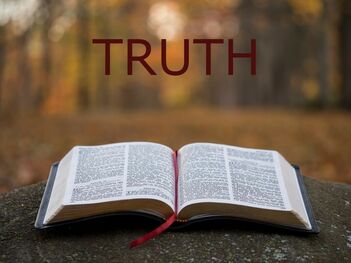 Photo by Aaron Burden on Unsplash
Photo by Aaron Burden on Unsplash
John 8:31-32 HCSB So Jesus said to the Jews who had believed Him, “If you continue in My word, you really are My disciples. You will know the truth, and the truth will set you free.”
John 18:37-38 HCSB “You are a king then? ” Pilate asked. “You say that I’m a king,” Jesus replied. “I was born for this, and I have come into the world for this: to testify to the truth. Everyone who is of the truth listens to My voice.” “What is truth? ” said Pilate. After he had said this, he went out to the Jews again and told them, “I find no grounds for charging Him.
Editor’s Note: The following are excerpts from the article What Is Truth written by Bill Bouknight retired Senior Pastor of Christ Methodist Church, Memphis, TN, and contributing editor of Preaching.
What Is Truth?
Bill Bouknight
Just hours before Jesus died for us, the Roman Governor Pontius Pilate asked Jesus, “What is truth?” Jesus was on trial before this pagan judge who had the power to sentence Him to death. Pilate asked, “Are you a king?” Jesus replied, “Yes, and I came into the world to testify to the truth.” Pilate responded, probably with cynical derision, “What is truth?”
For Pontius Pilate, truth was whatever the Roman emperor said it was. Romans believed Caesar was divine. Therefore, when Christians boldly declared Jesus as Lord, they were saying Caesar was not. The word lord refers to one’s ultimate allegiance, and a person can have only one lord at a time.
Therefore, when Christians declared Jesus as Lord, they were saying Caesar was not lord, and many Christians were killed for clinging to that truth. There was no room for dueling lords in the Roman Empire.
The night before Jesus encountered Pilate, He agonized in prayer in the Garden of Gethsemane. Though He was facing a cross, He did not pray for Himself. He prayed for us, His followers. In John 17:17, He prayed, “Sanctify them by the truth.” The word sanctify means “to set apart for sacred use or to make holy.” “Sanctify them by the truth.” Our Lord defined truth: “Your word (that is, God’s Word) is truth.”
Today in America, our secular culture opposes biblical truth. That shouldn’t surprise us. Our Bible is a counter-cultural document. Some Americans don’t like the Bible’s definition of marriage, so they are trying to invent a different one. Some Americans do not reverence the holy name of God, so they use that name as a common expletive. Some Americans destroy their own unborn babies if those unborn babies are deemed to be inconvenient. The Bible is at odds with all cultures, including America’s secular culture.
What is truth? The sad truth is that most Americans cannot answer that question because the majority of Americans—72 percent, in fact—do not believe there is any such thing as absolute truth. This was revealed in surveys done by Barna Group. Sadly, 40 percent of evangelical Christians do not believe in absolute truth.
Absolute truth is defined as “unchanging truth from God that is applicable to all persons in all situations.” According to the surveys, most Americans do not rely on the Bible as their primary guide for truth and instead try to figure out for themselves what is right or wrong. You know that our ability to rationalize anything we want to do is almost unlimited. Is there any wonder that surveys report little difference in ethical behavior between Christians and non-Christians in America?
Religion for many Americans has become a matter of taste rather than a matter of truth. Many Americans seem to select their beliefs and moral standards as they would a new suit, asking not, “Is it true?” but, “Does it fit me well?”
In every major religion, there are some noble thoughts and ideas. We Christians should respect all the major world religions, and we should focus on lifting up Christ rather than putting down other religions. However, never think for a moment that Islam, Buddhism, Hinduism and Christianity are basically teaching the same thing by using different terminology. There are distinct and mutually exclusive doctrines in these major religions.
We Christians believe that in Jesus of Nazareth we meet God in human form. None of the other religions makes such a claim for Buddha, Mohammed, Moses or Confucius.
Muslims and Jews consider Jesus to have been a person, perhaps a prophet, but certainly not the divine Son of God. They do not believe He was crucified for our sin or rose from the dead. Don’t let anybody tell you that all major religions are merely different slants on the same truth. On the most significant issues, the major religions directly contradict one another.
Another major difference among the various religions is the degree of tolerance they extend to other faith groups. I know of no majority-Christian country where your life is in danger because you affirm a different faith, but there are many non-Christian countries in the world today where your life and your family would be at risk if you dared to deviate from the faith of the majority.
Consider the threat of ISIS, the Islamic State, whose armies are rampaging across Iraq, Syria and Lebanon. They are commanding Christians either to convert to Islam or be executed. Here is a religious truth in the form of a mathematical equation: False religion equals dangerous theology equals dreadful deeds.
All truth is exclusive, otherwise it is called opinion. If you make a truth claim, you are saying the opposite is untrue. If you say Memphis is on the east bank of the Mississippi River, the claim that it is on the west side is false. When Jesus said He was the way, the truth and the life, He did not say He was a way or one version of the truth.
When you think about it, God never would confuse people with multiple recipes for salvation. The subject is too important, and the recipe too costly. After all, it required the death of Jesus Christ on the cross as the only sufficient sacrifice for the sins of the world.
Jesus would have none of this mix-and-match religion. Jesus was (hold your breath!) exclusive! Not in regard to people—He included everybody. He was exclusive in regard to truth. He said, “No one comes to the Father but by Me” (John 14:6). The apostle Peter said, “There is no other name under heaven given to men by which we must be saved” (Acts 4:12). Jesus said, “Whoever does not honor the Son does not honor the Father who sent Him” (John 5:23).
If you don’t believe God has a sense of humor, let me give you some evidence to the contrary. There was an 18th century French philosopher named Voltaire. He was critical of Christianity and skeptical about the Bible. He made this prediction: “In 100 years the Bible will be a forgotten book found only in museums.” Guess what: 100 years after he made that prediction, his home was being used as an office of the Geneva Bible Society. God must have chuckled!
Our challenge, Christians, is to be firm in the truth without being condescending, to be bold without being arrogant, to say to our critics again and again, with winsomeness and a smile, “I respect your viewpoint, but I am anchored to the truth of Scripture, and there I must stand.”

That brings me to the answer I propose to the question: What is truth? I hope you will agree with me that Jesus Christ and Scripture are absolute truth.
Truth was in Jesus’ purpose statement. He said, “I came into the world to testify to the truth” (John 18:37) and “If you hold to my teaching…then you will know the truth, and the truth will set you free” (John 8:31-32).
Our culture has trouble with Jesus’ words about truth because the cultural referees worship at the altar of relativism. Tolerance is one of the few moral absolutes in America, but it’s not a healthy tolerance that respects every person’s belief whether one agrees. Instead, it is an unhealthy tolerance that requires us to affirm all religious beliefs are equally true and that none is absolutely true. We must reject that brand of tolerance.
Jesus was either the personification of absolute truth, or He was the greatest fraud in history—take your choice—but Jesus was not something in between. If you reduce Christ to the lowest common denominator that other religions can accept, you deny the Christ of Scripture.
The Bible is an absolutely unique book. Millions of people during thousands of years have proved by experience this truth: “The law of the Lord is perfect, reviving the soul” (Ps. 19:7). After 2,000 years, no expert in any field has disproved a single statement from the Bible, but that shouldn’t surprise us because “all Scripture is God-breathed” (2 Tim. 3:16) or inspired by God.
Today the mainline denominations of America are in a struggle for their very souls. Though the debate seems to be about sexual morality, the real issue is the definition of truth. To be more specific, the issue is this: Is the Bible God’s absolute truth for us or just one ancient version that needs updating?
Pray for your local church and denomination. Only God has sufficient power and wisdom to heal, reform and renew the churches of America.
In Billy Graham’s great autobiography Just as I Am, he describes the turning point in his ministry. The year was 1949. Billy was 30 years old. He was about to begin an evangelistic crusade in Los Angeles, but he was troubled. A friend had said to him, “Billy, you’re 50 years out of date. People no longer accept the Bible as being inspired the way you do. Your faith is too simple. Your language is out of date. You’re going to have to learn the new jargon if you’re going to be successful.”
At that time, Billy was staying at a retreat center in the San Bernardino Mountains. Unable to sleep one night, he got up, picked up his Bible, and took a walk in the woods. He found a tree stump and made it his altar. Placing his Bible on it, he fell on his knees and prayed: “Oh, God! There are many things in this book I do not understand. There are some areas in it that do not seem to correlate with modern science. But Father, I am going to accept this as Thy Word—by faith! I’m going to allow faith to go beyond my intellectual questions and doubts, and I will believe this to be Your inspired Word.”
Billy got up off his knees, his eyes stinging with tears. He wrote, “In my heart and mind, I knew a spiritual battle in my soul had been fought and won.”
As they say, the rest is history!
I challenge us to follow Billy Graham’s example and to build our lives on absolute truth. If we have been casual or careless about our daily Bible reading, let’s repent! If we have been reluctant to depend on the Bible fully, let’s repent! Never be apologetic in relying on biblical authority. With boldness declare, “Jesus Christ and the Holy Bible are truth for me, and there I take my stand!”
 RSS Feed
RSS Feed